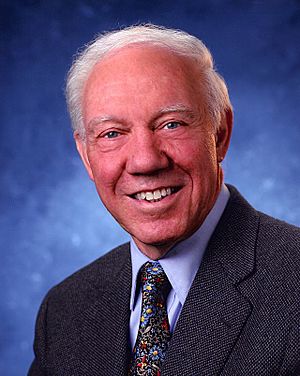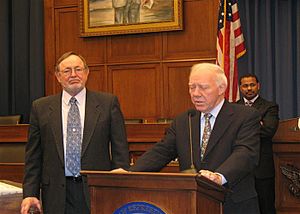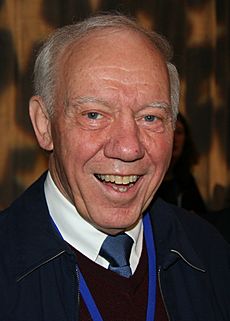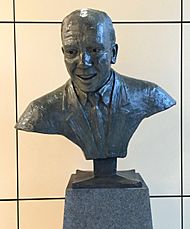Jim Oberstar facts for kids
Quick facts for kids
Jim Oberstar
|
|
|---|---|
 |
|
| Member of the U.S. House of Representatives from Minnesota's 8th district |
|
| In office January 3, 1975 – January 3, 2011 |
|
| Preceded by | John Blatnik |
| Succeeded by | Chip Cravaack |
| Chair of the House Transportation Committee | |
| In office January 3, 2007 – January 3, 2011 |
|
| Preceded by | Don Young |
| Succeeded by | John Mica |
| Ranking Member of the House Transportation Committee | |
| In office October 10, 1995 – January 3, 2007 |
|
| Preceded by | Norman Mineta |
| Succeeded by | John Mica |
| Personal details | |
| Born |
James Louis Oberstar
September 10, 1934 Chisholm, Minnesota, U.S. |
| Died | May 3, 2014 (aged 79) Potomac, Maryland, U.S. |
| Political party | Democratic |
| Spouses | Jo Garlick (Deceased) Jean Kurth |
| Children | 4 |
| Education | University of St. Thomas, Minnesota (BA) College of Europe (MA) |
James Louis Oberstar (born September 10, 1934 – died May 3, 2014) was an American politician. He served in the United States House of Representatives from 1975 to 2011. He was a member of the Minnesota Democratic–Farmer–Labor Party.
Oberstar represented Minnesota's 8th District. This area included cities like Duluth and Hibbing. He was the chairman of the House Transportation and Infrastructure Committee from 2007 to 2011. He was the longest-serving member of the U.S. House from Minnesota.
Contents
Early Life and Education
James Oberstar was born in Chisholm, Minnesota. His family home in Chisholm was very important to him. His father, Louis, worked as an iron ore miner. He was also an early member of the United Steel Workers union.
Oberstar finished high school in Chisholm in 1952. He then went to the College of St. Thomas (now the University of St. Thomas) in Minnesota. He earned his bachelor's degree in 1956. He later received a master's degree in European Studies from the College of Europe in Belgium. He also studied at other universities.
He worked for four years as a language teacher for the United States Marine Corps. He taught English to Haitian military staff. He also taught French to American Marine officers.
Before becoming a representative, he worked for 12 years for U.S. Representative John Blatnik. Blatnik was also from Minnesota's 8th District. Oberstar became Blatnik's chief of staff. He also managed the Committee on Public Works for the U.S. House.
Serving in the U.S. House of Representatives
Oberstar was first elected to Congress as a Democrat in 1974. He was reelected 17 times. He served from January 3, 1975, to January 3, 2011.
Focus on Transportation and Safety
He was known as an expert in aviation and aviation safety. He was a member of the Transportation and Infrastructure Committee for his entire time in the House. His predecessor, John Blatnik, had also chaired this committee. Oberstar also served on the President's Commission on Aviation Security and Terrorism.
In 1965, Oberstar helped create the Economic Development Administration. This agency helps create and keep jobs in struggling American communities.
Oberstar strongly supported Cirrus Aircraft, an aircraft maker in Duluth. He helped bring the company to Minnesota in 1994. That same year, he helped pass a law called the General Aviation Revitalization Act. This law helped the entire general aviation industry grow again.

Promoting Active Lifestyles
Oberstar was a big fan of cycling. He worked to create trails for biking and hiking. He wanted to encourage people to live active, healthy lives. In 2005, he helped pass the SAFETEA-LU act. This was a huge program that funded transportation projects. It included money for highways, bridges, and public transport like subways and buses. It also created the Safe Routes to Schools program. He often spoke about changing our transportation system. He wanted it to be less about fuel and more about human power.
Political Stances
Oberstar usually voted with the liberal side. However, he did not support strict gun control. This was common for politicians from his party in Minnesota. Minnesota has a strong tradition of hunting and fishing. In 2007, he was one of a few Democrats who voted against federal funding for stem cell research.
After the I-35W Mississippi River bridge collapsed, Oberstar acted quickly. He introduced a bill to give $250 million to Minnesota. This money helped build a new bridge very fast.
In 2004, Oberstar opposed a bill about private spaceflight. He worried it didn't protect passenger safety enough. He said, "I do not want to see people dead from a space experiment."
During his time in Congress, Oberstar held many important roles. He was a leader on the House Transportation and Infrastructure committee. He also co-chaired the Great Lakes Task Force. He was part of many other groups, including:
- The Bike Caucus
- The Congressional Steel Caucus
- The Medical Technology Caucus
- The Mississippi River Caucus
- The Native American Caucus
- The Renewable Energy Caucus
Awards and Honors
In 2009, Oberstar received the Tony Jannus Award. This award honors leaders in commercial aviation.
In May 2011, a Great Lakes ore carrier was named after him. This ship, the MV Honorable James L. Oberstar, carries iron ore.
In 2012, France honored him. He was made Commander in the French Ordre national du Mérite.
In October 2015, the new passenger terminal at the Duluth International Airport was named for him. Oberstar had helped get money for this airport. A sculpture of him was also shown there.
In 2016, he was added to the Minnesota Aviation Hall of Fame. This honor came after his death.
Political Campaigns
When John Blatnik decided not to run again in 1974, he supported Oberstar. Oberstar won that election. He was reelected 16 more times without much trouble. Democrats held this seat from 1947 until 2011. Oberstar served longer than anyone else from Minnesota in either house of Congress.
In the 2006 election, Oberstar faced a strong opponent. This was former U.S. Senator Rod Grams. Even though some polls showed a close race, Oberstar won by over 30 points. He won every county in his district.
In 2008, his opponent was Michael Cummins. Oberstar won with more than 67 percent of the vote.
In the 2010 election, Oberstar lost a close race. He was defeated by Chip Cravaack. This was a big surprise for Democrats across the country.
Personal Life
James Oberstar lived with his wife, Jean, in Potomac, Maryland. He also kept his childhood home in Chisholm, Minnesota. He passed away in his sleep at his home in Potomac on May 3, 2014. He was almost 80 years old. He was survived by his four children and eight grandchildren.
Boards and Other Affiliations
- Board Member, Board of Trustees, John F. Kennedy Center for the Performing Arts, 1995–2014
- Board Member, Mineta I.I.STPS Institute, San Jose State University, 1995–2014
 | Charles R. Drew |
 | Benjamin Banneker |
 | Jane C. Wright |
 | Roger Arliner Young |



